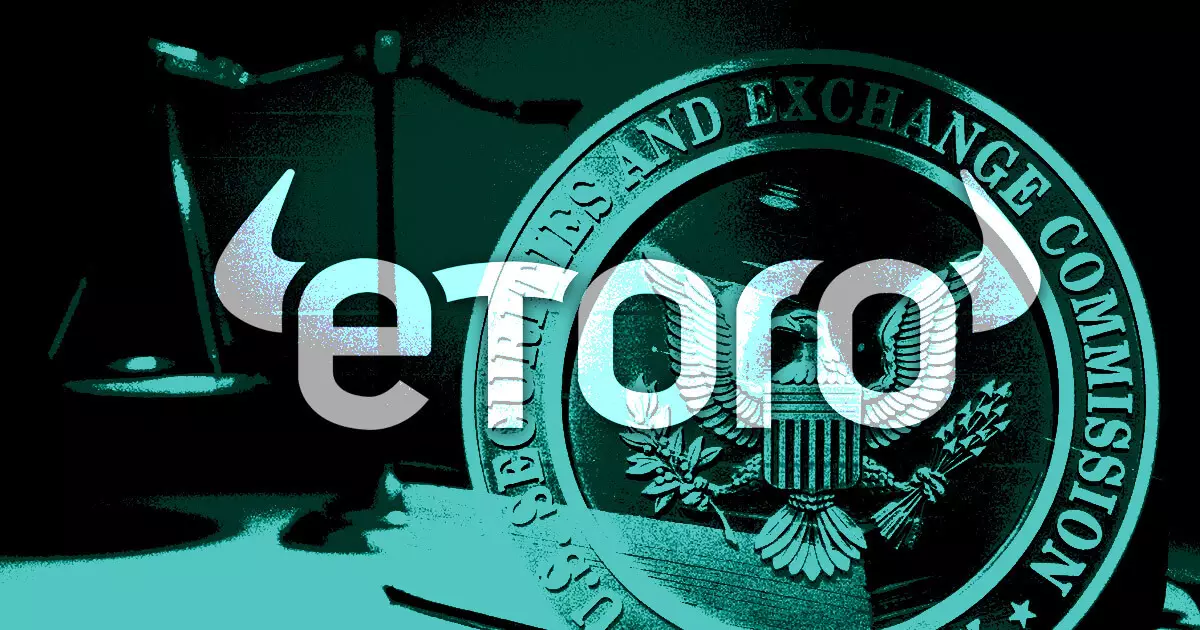In a significant development within the cryptocurrency sector, trading platform eToro has announced a cessation of trading for most digital assets. This announcement follows a settlement with the US Securities and Exchange Commission (SEC), which involved a substantial fine of $1.5 million due to compliance failures concerning the trading of certain crypto assets classified as securities. This pivotal moment signals a broader trend among cryptocurrency firms as they struggle to navigate an increasingly stringent regulatory environment.
The Nature of the Violations
The SEC’s investigation into eToro unveiled that the platform permitted US customers to engage in trading certain cryptocurrencies without adhering to essential federal registration requirements since as early as 2020. Such activities not only posed risks to consumers but also violated the established legal framework governing securities. While eToro did not expressly admit to these allegations, the company’s decision to limit its offerings to a select few digital assets—specifically Bitcoin, Bitcoin Cash, and Ethereum—highlights a shift toward compliance and regulatory adherence.
Gurbir S. Grewal, the SEC’s Director of Enforcement, remarked on the implications of this fine, emphasizing that eToro’s decision to discontinue the trade of several tokens reflects a commitment to adhere to federal securities laws. By voluntarily removing these investment contracts from its platform, eToro has paved the way for a more structured regulatory approach within the crypto domain, potentially enhancing investor protection and fostering a compliant environment for future market entrants.
This unfortunate predicament for eToro is part of a larger regulatory assault on the cryptocurrency marketplace, during which various platforms, including Binance, Kraken, and Coinbase, have come under the SEC’s scrutiny. Furthermore, there are indications of possible legal actions against Robinhood and NFT marketplace OpenSea, suggesting that the SEC is broadening its focus and that other intermediaries may soon find themselves facing similar challenges.
Amidst these regulatory hurdles, eToro co-founder and CEO Yoni Assia expressed a forward-looking approach. The settlement reportedly allows eToro to shift its focus toward developing innovative products within the confines of regulatory frameworks. Stressing the importance of compliance, he stated that collaboration with global regulators is imperative. Assia also noted that with emerging regulatory clarity in regions like the UK and Europe, the company anticipates a similar structure in the U.S. soon.
Operational Changes and User Considerations
In light of the settlement, eToro has outlined several changes that will affect its users. Customers can opt to either liquidate their crypto positions or transfer accepted cryptocurrencies to the eToro wallet before the deadline of March 11, 2025. After this date, any remaining positions in unsupported digital assets will be sold, with proceeds redirected to users’ cash accounts. This action underlines eToro’s intent to facilitate a seamless transition while ensuring compliance.
As eToro adjusts its operational framework in response to regulatory pressures, the platform serves as a case study in the evolving cryptocurrency space. The unfolding landscape necessitates adherence to legal standards, and eToro’s proactive measures could establish a viable model for other firms seeking to align with regulatory expectations. In a turbulent market, the commitment to compliance may not only safeguard investor interests but also pave the way for sustainable growth in the rapidly changing world of digital assets.



Leave a Reply